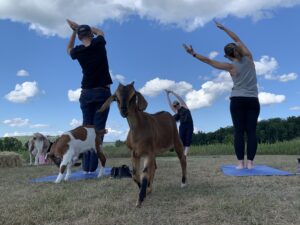Farmer Veteran Allison Lavine’s Pathway to Farming
Farmer veteran, Allison Lavine, recounts the path that led her from civilian life, to the military, to her current career as a farmer at ZiegenVine Homestead.
Since 2014, Allison Lavine and her husband have owned and operated ZiegenVine Homestead in Savona, NY. The name ‘ZiegenVine’ is derived from their last names. ‘Ziegen’ means goat in German and ‘Vine’ means vine in French and together this translates to “goat vine” or “land of the goats”.
The ZiegenVine Homestead, a 103-acre property, comprises 60 acres of fields and woodlands and 40 acres of timber stand from which Allison and her husband have harvested timbers to build a beautiful, conical roof on a section of their barn. On the property, visitors find bees, chickens, turkeys, ducks, pigs, goats, hay fields, vegetable gardens (for themselves and campers), goat yoga classes, and event space for gatherings. In the next 5 years, they will be adding an outdoor farm kitchen and offering soap-making, poultry processing, and potentially herbal classes. As you might imagine on a farm, whose name translates to ‘land of the goats’, the goats on ZiegenVine Homestead are the stars of the farm, providing joy and laughter during yoga and milk for handmade soaps. Allison finds following the process of soap making and creating different scent combinations therapeutic.
Unfulfilled in her career before the military, Allison enlisted at age 24 in the Coast Guard at Cape May, NJ. She trained at the Defense Information School, studying photojournalism, videography, photography, and public affairs.
“The transition from the military back into civilian life I would say was difficult,” Allison said. “There is a level of teamwork and comradery within the military you don’t always experience in the civilian sector.”
Military service members train and perform their mission together across all manners of geographical terrain types, despite the climate or weather conditions, and with little consideration to what day of the week it is, or if that day is a holiday. Allison found farming to be similar.
“Farming doesn’t stop,” she explained. “It’s a 365-day-a-year job. It doesn’t matter if it’s a holiday, it doesn’t matter if it’s cold and rainy, or 100 degrees outside, the military is the same way — they don’t stop.”
Opposed to the idea of farming at the beginning, Allison warmed up to the idea when she and her husband began educating themselves on where their food comes from.
“That kind of hit home,” she said. “We wanted to know what is in our meat, and we wanted to know that we can raise it and know exactly what we are eating.”
To prepare for their farming venture, they watched documentaries, read lots of books, and reached out to their county’s Cornell Cooperative Extension (CCE). Getting started, their biggest obstacles have been fencing and funding as they aim to run their operation without loans. While they know there are loans out there, they would like to be self-sufficient and self-sustaining, and hopefully not rely on loans.
Allison first began interacting with Farm Ops, the Cornell Small Farms Program’s (CSFP) project to support veterans in agriculture, when hearing of the opportunity of veterans’ free enrollment into the pastured pigs online course. Farm Ops supplemented the course materials with veteran-only cohort learning sessions.
“It was important to me to be able to see what other veterans are doing as far as raising pigs/hogs and just the interaction with other veterans to me is important,” Allison explained. “Given that the suicide rate for veterans is so high and the suicide rate for farmers is almost just as high, I think it’s extremely important for farmer veterans to have a community in which they can reach out to other farmers if they need help with something, even if they only need somebody to listen to them for a few minutes that understands where they are coming from.”
Allison said she appreciates the CSFP online course offerings, the virtual Farm Ops cohort sessions, and other veteran-focused virtual trainings, as she does not have to take time away from the farm.
After transitioning out of the military, Allison found herself in a civilian job back behind a desk, which was the place that drove her toward military service in the first place. Since becoming a farmer, Allison’s well-being has improved.
“I love being outside,” she sahred. “I love being with my animals and having the time to watch the butterflies.”

The goats on ZiegenVine Homestead are the stars of the farm, providing joy and laughter during yoga.
Allison Lavine / ZiegenVine Homestead
Watching Allison in action, it is apparent she enjoys farm work and that sharing the farm experience with her community, whether it be through her camp sites, products in her farm store, or a goat yoga class.
Thinking back to her own transition into farming, she advises: “Visit other veteran farms! While a lot of veterans don’t announce that they are a veteran, there is a bond amongst veterans, and they are willing to share more with another veteran that they may not be willing to share with the general public.”
Allison and her husband welcome visitors to take it all in on their homestead, ZiegenVine, Land of the Goats.

